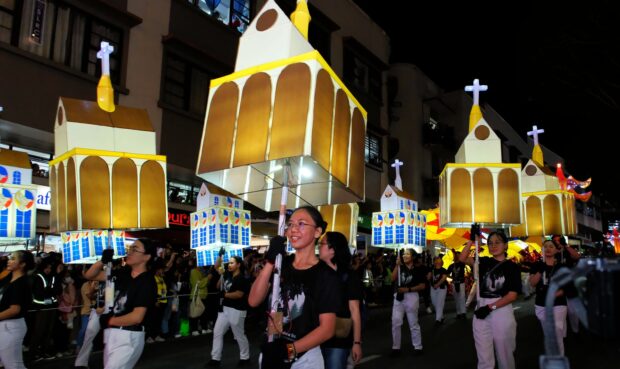
CHRISTMAS IN BAGUIO | The yuletide is historically the peak season for Baguio tourism, which helped drive Baguio’s economy to surpass prepandemic levels in 2022. Long weekends have drawn repeat visitors, who filled up parks and restaurants and generated traffic gridlock. (Photo by NEIL CLARK ONGCHANGCO / Inquirer Northern Luzon)
BAGUIO CITY, Benguet, Philippines — The economy of this city had surpassed its prepandemic growth rate in 2022, making it one of the communities that have overcome the social and financial impact of COVID-19, a top Cordillera statistician said.
Baguio’s 2022 city gross domestic product (GDP) rose to 11.3 percent (P155.03 billion), growing from 10 percent (P139.28 billion) in 2021, said Aldrin Federico Bahit Jr., Cordillera chief statistical specialist of the Philippine Statistical Authority, in a briefing last Monday.
The GDP measures the products and services generated by the mountain city in a year, which was P146.9 billion in 2018 and P152.9 billion in 2019. Tourism may have provided the impetus needed to fast-track Baguio’s growth.
Like the rest of the country, the city GDP dropped to P126.7 billion in 2020 when its economy contracted due to pandemic-induced lockdowns and the quarantines that required most businesses to shut down.
Bahit reported that tourism-oriented shops and enterprises appeared to have influenced the city’s steady economic growth, which “cut across three major industries from transportation to manufacturing, which includes the production of ‘pasalubong’ (souvenirs).”
The city’s industry sector (P83.9 billion, largely from the Baguio economic zone), its services sector (P225.64 billion) to include accommodations and restaurants and its agricultural services (P28.12 billion) grew last year, with “the services sector reflecting the fastest acceleration,” he said.
Biggest contributor
Almost half of the Cordillera’s gross regional domestic product (GRDP) or 45.9 percent is contributed by Baguio.
The Cordillera is composed of the provinces of Benguet, Kalinga, Ifugao, Apayao, Abra, and Mountain Province and the cities of Baguio and Tabuk (Kalinga).
Bahit said last year’s Cordillera regional tourism satellite accounts, which measure the impact of tourism on the economy, estimated that Baguio and other tourism destination towns in the Cordillera contributed 3.27 percent to the GRDP.
In 2022, the city tourism office recorded 1.042 million Baguio tourists, which was short of its 1.5 million visitors in 2019. As of October this year, Baguio recorded 787,572 guests, according to the city public information office last week.
In a recorded message, Baguio Mayor Benjamin Magalong said Baguio’s growth “demonstrates its resilience and strength.” Because the city’s per capita GDP (which measures income from goods and services) is also the highest in the Cordillera (at P420,000 compared to the Cordillera’s per capita GDP of P183,800), “the average person in Baguio earns significantly more than the average person in the region,” the mayor said.
399